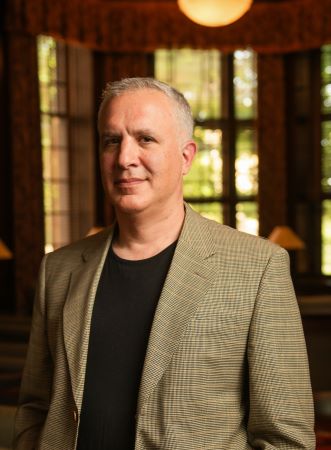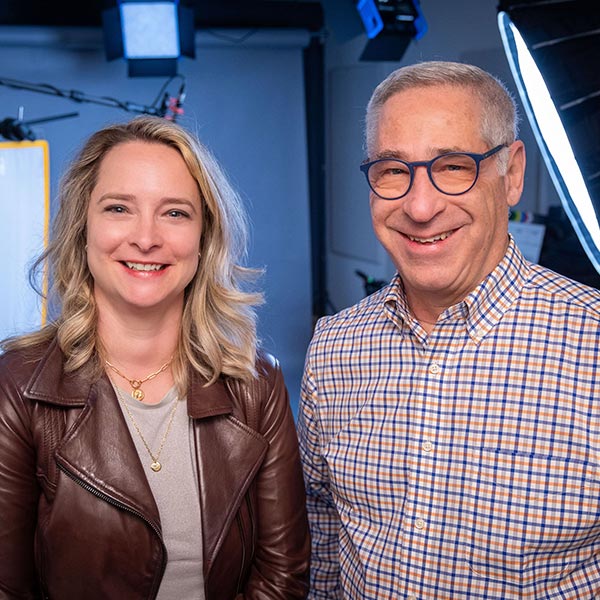Rare diseases, often and unfortunately, are met by a scarcity of effective treatments.
Conscience is a new non-profit open science initiative that aims to fill that and other voids in bio-medical research. The Canadian project welcomes collaborators from a wide spectrum of institutions and companies, and two McGillians are playing key roles on its leadership team.
“[The name] Conscience evokes the fact that we’re trying to meet an obligation to people – people with rare diseases who have been told, time and again, ‘Sorry, we don’t have a medicine for you, and no one’s researching it,’” says Richard Gold, BSc’84, a James McGill Professor in the Faculty of Law and the director of McGill’s Centre for Intellectual Property Policy. Gold is serving as the strategic lead, policy and training, for Conscience.

In addition to rare diseases, Conscience will fill a void in any area of medical research “that has failed in the market, i.e., would be very difficult to gain investors as a money-making venture,” says Aled Edwards, BSc’83, PhD’88. Edwards, an adjunct professor of neurology and neurosurgery at McGill, a professor of molecular genetics at the University of Toronto, and the CEO of the Structural Genomics Consortium (SGC), is the chief science officer for Conscience.
Edwards says that Conscience wants to explore ways in which artificial intelligence can play a greater role in discovering new treatments more rapidly. He adds that AI is not yet a major player in basic bio-medical research.
“Eventually, we’ll be able to observe a disease, identify what went wrong, and design the drug on a computer. Our mission is to make it happen as fast as possible.”
Edwards cites antibiotic and antimicrobial resistance, as well as pandemic preparedness, as some of the areas of research that Conscience hopes to focus more attention on.
“There’s no market [to design drugs for] a pandemic that may never happen. But if we’re not prepared for it, we could be in trouble.”
Aled Edwards
“There’s no market [for drugs to address] a pandemic that may never happen,” Edwards says. Adds Gold, “Science knows that there will be another pandemic; we don’t know the size, or when it will happen. One focus will be on preparing medicines that could prevent another one.”
Scientists have already narrowed down a list of probable future suspects, says Edwards.
“Virologists around the world have identified between 10 and 20 viruses that have the greatest potential of becoming a pandemic. Most are respiratory viruses.”
There are also two or three high-priority corresponding drug targets that may provide effective treatments. By supporting work in this area, the Conscience team would, again, be filling a gaping hole in essential research.
“The market doesn’t [encourage] people to work on a virus that, currently, is rarely transmitted between people, and only in a remote part of India,” says Edwards. “But, if we’re not prepared for it, we could be in trouble.”
Conscience was officially launched last fall by the SGC with $105.7 million in funding (including $49 million from the Canadian government). Its board members include Florence Rozen, BSc’84, PhD’89, the scientific director of investments for the Fonds de solidarité FTQ.
At the launch event, Ryan Merkley, the chief executive officer of Conscience, outlined the project’s approach. “We’re turning the discovery of new medicines into a team sport. The market’s failures don’t have to be our failures. Together, we can develop artificial intelligence solutions and use open collaboration strategies to solve for diseases few others are paying attention to.”
As part of its open science approach, Conscience has created a CACHE (Critical Assessment of Computational Hit-Finding Experiment) Challenges program, open competitions which encourage collaborative efforts to address a rare disease problem. The first such challenge targeted an under-researched gene associated with Parkinson’s disease. The results of that initiative will be presented at a symposium in March. Two upcoming challenges will address COVID medicines, while another will focus on a rare childhood cancer.
The team sport concept championed by Conscience hopes to encourage partnerships between scientists at different institutions and between researchers at different types of organizations (universities, private companies, etc). It also hopes to spark international efforts.
Says Edwards, “We’re going to have to work across countries, universities, sectors – simply because there isn’t enough money to build it all in one place and concentrate all the expertise there.”
All findings will be freely available to anyone interested.
“Everyone has to agree upfront to share their data; otherwise, there’s no way of knowing whose is best,” says Gold. “Everyone also agrees not to patent the molecules they discover. We want other people to build on them. Everything is open, because the moment you start negotiating around intellectual property, you’ve just delayed your project by two to four years. Patents are the element that takes the longest to negotiate between universities and firms.”


